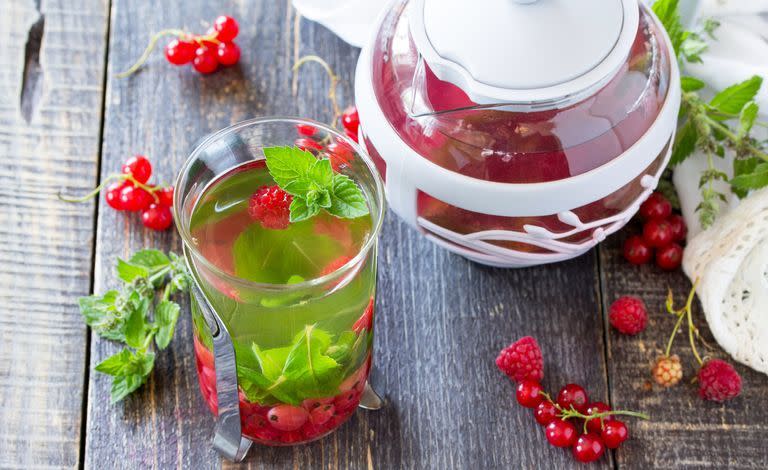Raspberry leaf tea health benefits, backed by research

Raspberry leaf tea is a herbal tea made from the leaves of the red raspberry plant. Rather confusingly, it's not the same as raspberry fruit tea. Raspberry leaf tea has more of a black tea taste and look, and comes with its own benefits and uses.
Here, we look at everything you need to know about raspberry leaf tea, including what it is exactly, what it can be used for and the potential side effects:
What is raspberry leaf tea?
Red raspberry leaf tea is a herbal tea made from the leaves of the red raspberry plant, so it differs slightly to raspberry fruit tea and comes with its own set of benefits.
'You can buy it in loose form, tea bags and in capsules,' says Liberty Mills, a Certified Integrative Health and Nutrition Coach. 'It does not taste of raspberries but has more of a black tea taste and look.'
So what's the best way to drink raspberry leaf tea? 'If drinking it, steep your teabag for three mins or leaves in a pot for around 15 mins before drinking,' she adds. 'Do not our boiling water over the leaves to not burn them. Begin with a tiny cup a day and gradually build up to a maximum of three cups.'
5 raspberry leaf tea health benefits
Raspberry leaf tea comes with a number of health benefits that are backed by research. Here, Mills outlines five advantages of drinking raspberry leaf tea:
1. Raspberry leaf tea is filled with vitamins
Raspberry leaves are high in Vitamins B, C, and E, as well as manganese and magnesium. It is the high content of magnesium that helps relieve the symptoms of menstrual cramping in periods.
2. Raspberry leaf tea is an antioxidant
Red raspberry leaves contain polyphenols such as tannins and flavonoids. These act as antioxidants in your body and can help protect cells from damage, and are excellent for those looking for an anti-inflammatory diet to support them.
3. Raspberry leaf tea is a great source of iron
Raspberry leaves are also a great source of iron. For example, 28 grams of red raspberry leaves pack 3.3 mg of iron, which is 18 per cent of the recommended daily intake (RDI) for women aged 19–50. Many women who have heavy bleeding suffer from low iron. This is a convenient and low-cost way of increasing your iron intake. It would also benefit those who consume a plant-based diet who may be looking to increase their iron levels within their diet.
4. Raspberry leaf tea could boost female fertility
According to The Everything Fertility Book, it is believed that raspberry leaf tea is also a "uterine tonic". It is thought that toning the uterus in women is likely to improve fertility fitness as women are more likely to conceive when the uterus is toned. Acting in a similar way that acupuncture increases the blood flow to the uterus infertility acupuncture.
5. Raspberry leaf tea helps ease bloating
Raspberry leaf tea can also help with abdominal bloating for men and women due to the leaves' diuretic effects. And red raspberry leaf tea could help ease puffiness caused by water retention, which often occurs during pregnancy.

Raspberry leaf tea and pregnancy
Aside from the health benefits it has for everyone, raspberry leaf tea is said to be a great drink for women during pregnancy and labour.
'During pregnancy, the benefit of drinking the leaf tea is to increase the blood flow to the uterus and encourage the uterine muscle fibres to produce a better contraction,' explains Mills. 'Therefore, it is not recommended to drink this tea in the first trimester but to start after 32 weeks.
'The idea of drinking the tea in pregnancy is not so much to speed up labour but to help it progress the contractions regularly.'
One randomised controlled trial of 192 women showed no adverse effects to mother or baby when drinking raspberry leaf tea, a shorter second stage of labour (a mean difference of 10 minutes), and a lower rate of forceps use.
Meanwhile, another study taken over several months indicated 'that women who ingest raspberry leaf might be less likely to receive an artificial rupture of their membranes, or require a caesarean section, forceps or vacuum birth than the women in the control group'.
Raspberry leaf tea side effects
So, with all these great benefits, does raspberry leaf tea come with any side effects?
'The known side effects of raspberry leaf tea are looser bowels, nausea and intensified Braxton hicks,' says Mills. 'However, everyone has bio-individuality, so start small and see you respond.'
'Do not take raspberry leaf tea if you have any existing medical conditions such as epilepsy, cancer, blood clotting disorders, are having multiple births or have not gone full term on your last pregnancy,' she adds. 'And never give it to children.'
Meanwhile, if you drink the tea when pregnant and get strong Braxton hicks, reduce the amount of tea you consume.
'As with any herbal supplement or herbal addition to your diet, especially when pregnant, please always consult your midwife, medical team or doula, if you wish to start to include raspberry leaf tea,' Mills advises.
Last updated: 14-06-2021
You Might Also Like

 Yahoo Finance
Yahoo Finance 